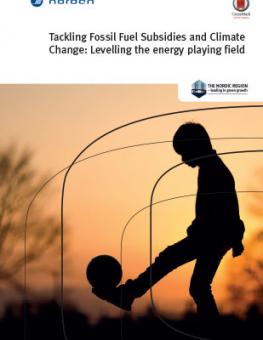
Tackling Fossil Fuel Subsidies and Climate Change: Levelling the energy playing field
Subsidies for the consuption of fossil fuels were estimated at US$550 billion in 2013, according to the International Energy Agency.
Subsidies for the consumption of fossil fuels were estimated at US$550 billion in 2013, according to the International Energy Agency.
This report by IISD and the Nordic Council of Ministers modeled the impact of removing fossil fuel subsidies in 20 countries between 2015 and 2020. The results show that this alone would reduce national emissions, against business as usual, by an average of 11 per cent. By taking 30 per cent of subsidy savings, and investing in renewable energy and energy efficiency, national emissions are reduced further to an average of 18 per cent by 2020. The report also includes case studies of reform in the Philippines, Morocco and Jordan.
Participating experts
You might also be interested in
The Cost of Fossil Fuel Reliance
Government support for fossil fuels reached at least USD 1.5 trillion in 2023, new data shows.
Increased Support Needed to Achieve India's Clean Energy Goals
India is on track to achieve many of its 2030 clean energy goals but needs to step up government support measures to accelerate the deployment of offshore wind, electric vehicles, and green hydrogen, according to a new report.
Ending Export Credits for Oil and Gas: How OECD countries can end 2024 with a climate win
For a year now, Organisation of Petroleum Exporting Countries (OECD) governments have been negotiating an agreement that could put an end to oil and gas export finance. Following the acrimony in Baku, this would be a very real way for the OECD to show policy coherence, respond to calls from the poorest countries to stop subsidizing fossil fuels, and shift public finance to solutions.
COP 29 Outcome Moves Needle on Finance
In the last hours of negotiations, concerted pressure from the most vulnerable developing countries resulted in an improved outcome on the finance target, with a decision to set a goal of at least USD 300 billion per year by 2035 for developing countries to advance their climate action.